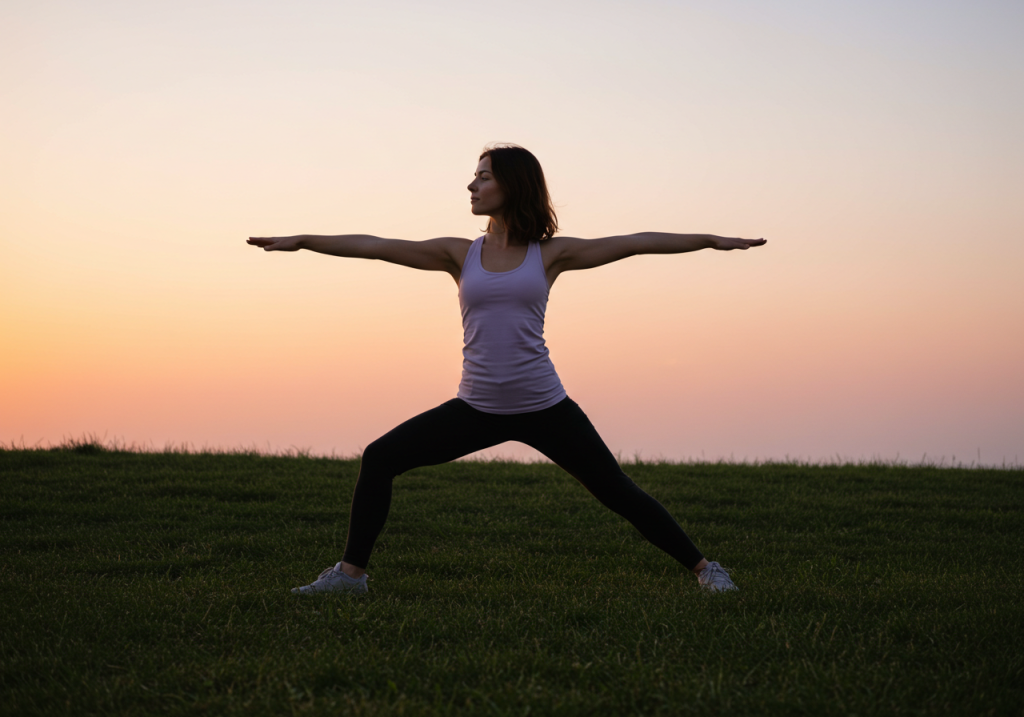What’s the Connection Between Mental Health and Exercise?

Let’s be real: when you think of exercise, your mind probably jumps to toned muscles, better stamina, or maybe shedding a few pounds. But here’s the thing—exercise isn’t just about transforming your body; it’s a game-changer for your mind, too. Imagine this: you’ve had a rough day, your thoughts are spinning, and stress is piling up like laundry on your bedroom floor. Then, you decide to lace up your sneakers, hit the pavement for a run, or roll out a yoga mat. Within minutes, something shifts. Your worries don’t vanish entirely, but they start to feel lighter, more manageable—like you’ve swept the dust out of a cluttered corner of your brain.
So, what’s the connection between mental health and exercise? It’s all about how movement sparks a chain reaction in your body and mind. When you get moving, your brain gets a much-needed reset. It’s not just a temporary distraction; it’s a powerful tool to lift your spirits and bring clarity to chaos. Whether it’s a heart-pumping cardio session or a gentle stretch, physical activity has a knack for cutting through mental fog. And the best part? You don’t need to be a fitness guru to reap the rewards—it’s accessible to everyone, anytime.
But the benefits don’t stop at a quick mood boost. Stick with it, and exercise becomes a long-term ally for your mental well-being. Picture it like tending to a garden: the more effort you put in—watering it with regular workouts—the more vibrant and resilient it grows. Research backs this up, showing that people who stay active consistently report lower levels of depression and anxiety. So, what’s the connection between mental health and exercise? It’s a partnership where sweat builds not just physical strength but emotional stamina, too.

Have you ever tried something like yoga or a brisk walk after a stressful day? The way your breath syncs with your body can feel like a mini-vacation for your mind. It’s not just about the physical release—it’s about giving yourself permission to pause and recharge. That’s the beauty of it: something as simple as moving your body can become your go-to strategy for tackling mental fatigue. Isn’t it incredible how a quick jog or a few stretches can shift your entire perspective?
Next time you’re feeling off-balance, don’t underestimate the power of a workout. Slip on those running shoes or hit the gym, and watch how it sharpens your focus and lifts your mood. What’s the connection between mental health and exercise? It’s a win-win that strengthens both your body and soul.
Mind Over Muscle: How Regular Exercise Boosts Mental Health
Ever wonder why you feel so good after a solid workout? Sure, your muscles might be screaming, but your mind feels lighter—like a weight’s been lifted off your shoulders. That’s the magic of endorphins, your body’s built-in mood enhancers. Think of them as tiny cheerleaders throwing a party in your brain every time you break a sweat. Even something as simple as a 20-minute walk can trigger this feel-good flood. What’s the connection between mental health and exercise? It’s those endorphins stepping in to turn a gloomy day into something brighter.
Now, let’s talk about stress—because who doesn’t deal with it? Between work deadlines, family responsibilities, and that nagging to-do list, life can feel like a juggling act gone wrong. Enter regular exercise: your personal stress shield. It’s not just about burning off steam in the moment; it’s about building a coping mechanism that sticks. When you’re pounding the treadmill or lifting weights, your mind gets a chance to hit pause on the chaos. It’s like rebooting your computer when it’s running slow—suddenly, everything works better. Studies show that consistent physical activity lowers stress hormones like cortisol, leaving you calmer and more in control.
And here’s a bonus: exercise adds structure to your day. In a world that often feels unpredictable, having a workout routine can be a comforting anchor. It’s something to look forward to, a little pocket of “you time” amid the storm. So, what’s the connection between mental health and exercise? It’s about giving your brain the tools to handle life’s ups and downs, one step—or squat—at a time.

The Mental Health Move: Exercise as a Key to Emotional Wellness
Let’s break it down: when you exercise, your body unleashes endorphins—those natural chemicals that make you feel on top of the world. It’s like flipping a switch from “blah” to “bliss.” Whether you’re dancing to your favorite playlist or jogging through your neighborhood, every move sends a wave of positivity to your brain. What’s the connection between mental health and exercise? It’s this instant mood-lifting power that makes physical activity so addictive in the best way possible.
But it’s not just a fleeting high. Keep up with it, and exercise starts working its magic over the long haul. Research consistently shows that regular movement can ease symptoms of anxiety and depression, sometimes even rivaling the effects of medication or therapy. Think of it like nurturing a plant: water it with steady workouts, and over time, you’ll see your emotional resilience blossom. You’re not just sweating—you’re cultivating a happier version of yourself.
Picture your mind as a cluttered closet, stuffed with worries and what-ifs. A good workout is like a spring cleaning session—it sweeps away the mess, leaving you with space to breathe and think clearly. And it’s not all solo work, either. Joining a fitness class, hitting the park with a buddy, or signing up for a local sports team adds a social spark to the mix. Suddenly, exercise isn’t just about moving your body—it’s about connecting with others, laughing through the sweat, and building bonds that boost your mood even more.
So, when life feels heavy, don’t sleep on the power of a workout. What’s the connection between mental health and exercise? It’s your ticket to a brighter, more balanced emotional landscape—just waiting for you to take the first step.
Breaking a Sweat, Breaking Stigmas: The Therapeutic Power of Exercise
Here’s a fun fact: when you exercise, your brain throws a party with endorphins as the guest of honor. These little mood-boosters flood your system, making you feel lighter and more capable of tackling whatever comes your way. Ever heard someone say, “I need to clear my head”? That’s exercise stepping in as an affordable, couch-free therapy session. What’s the connection between mental health and exercise? It’s this natural high that turns a workout into a mental reset button.
But there’s more to it than just feeling good in the moment. Exercise has a way of breaking down walls—both in your mind and in society. Think about the vibe at a gym, a yoga studio, or even a busy park trail. There’s this unspoken camaraderie among people moving together, sweating it out side by side. It’s like a community tapestry, stitched together by shared effort. In those spaces, conversations flow more easily, and the stigma around mental health struggles starts to fade. You’re not just toning your body—you’re opening doors to talk about the tough stuff.
That sense of belonging can be a lifeline. When you’re surrounded by others who get it—who know the grind of a tough workout mirrors the grind of life—it’s easier to let your guard down. So, what’s the connection between mental health and exercise? It’s a double whammy: a personal boost for your brain and a collective step toward normalizing mental health chats, all wrapped up in a sweaty, satisfying package.

From Gym to Joy: Exploring the Link Between Physical Fitness and Mental Resilience
Think of your mind like a car engine—it needs fuel to run smoothly. And guess what? Movement is premium-grade fuel for your mental resilience. When you push through a challenging workout—say, that last mile of a run or an extra set of push-ups—you’re not just building physical strength. You’re training your brain to handle life’s curveballs with the same grit. What’s the connection between mental health and exercise? It’s about forging a tougher, more adaptable mindset, one rep at a time.
Ever notice how a good sweat session can flip your perspective? Maybe your day started with a pile of stress—work drama, family chaos, you name it. Then, you hit the gym or go for a run, and suddenly, the fog lifts. Each bead of sweat feels like a worry melting away, replaced by a surge of confidence. It’s not just about surviving the day anymore—it’s about thriving through it. Physical fitness becomes a proving ground, showing you that you’re stronger than you think.
And here’s the deeper layer: sticking to a fitness routine teaches you discipline and perseverance. Those qualities don’t just help you power through a workout—they spill over into everyday life. Deadlines? Relationship hiccups? You’ve got this. Exercise builds a bridge to resilience, connecting physical effort with mental toughness. The gym, the park, or even your living room transforms into a sanctuary where you don’t just get fit—you get fortified.
Running Towards Recovery: How Exercise Improves Mental Well-Being
Picture yourself running down a quiet path, each step pushing your worries further behind you. That’s not just poetic—it’s science. When you run, your body pumps out endorphins, those feel-good hormones that deliver what’s famously called the “runner’s high.” It’s like a free dose of happiness, no prescription required. What’s the connection between mental health and exercise? It’s this euphoric lift that makes running—or any movement—a shortcut to better vibes.
But running offers more than a quick buzz. Step outside, and you’re greeted by nature’s extras: a cool breeze, the sound of rustling leaves, the rhythm of your feet on the ground. It’s a sensory escape that pulls you out of your head and into the moment. Think of it as a mental mini-vacation—no plane ticket needed. Plus, regular runs can level up your sleep game. A solid night’s rest is like a factory reset for your brain, sharpening your focus and brightening your mood. Imagine waking up refreshed instead of groggy—what a difference that makes!
So, when life feels like it’s piling on, consider hitting the road. Running is simple, effective, and doesn’t demand fancy gear—just you and your sneakers. It’s a straight path to mental clarity and well-being, one stride at a time.

Endorphins and Empathy: The Surprising Mental Health Benefits of Staying Active
Get moving—whether it’s a jog, a dance party, or a yoga flow—and your brain rolls out the red carpet for endorphins. These tiny heroes swoop in to fight off stress and sprinkle some joy into your day. But here’s the twist: staying active doesn’t just make you feel good—it makes you connect better, too. What’s the connection between mental health and exercise? It’s how physical activity tunes up your empathy, helping you vibe with the people around you.
Think about it: after a workout, you’re buzzing with energy, chatting with friends or family, and suddenly, you’re really hearing them. That post-exercise glow doesn’t just lift your mood—it sharpens your emotional radar. When you’re feeling good, it’s easier to step into someone else’s shoes and share a laugh or a heartfelt moment. It’s like endorphins don’t just cheer you up—they make you a better friend, too.
Sweat Your Stress Away: The Psychology of Exercise and Its Effects on Mental Health
Here’s the deal: exercise doesn’t just cover up stress—it rewires how you handle it. When you run, dance, or lift, your brain gets a full-on makeover. Studies show physical activity slashes anxiety, boosts self-esteem, and even keeps depression at bay. It’s like therapy you can do in your sneakers, no appointment needed. What’s the connection between mental health and exercise? It’s the way movement trains your mind to bounce back from life’s punches.

And don’t sleep on the social perks. Joining a workout crew—whether it’s a spin class or a pickup basketball game—adds a layer of support. Ever skipped a gym day and felt the slump? Friends can pull you back in, turning a solo sweat session into a group uplift. That sense of community amplifies the mental health perks, making exercise a total package for body and soul. So, next time stress creeps in, grab your gear and get moving—your mind will thank you.




